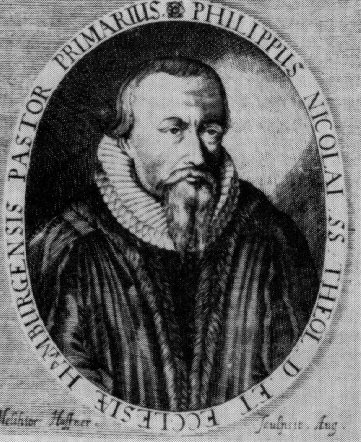|
首 頁
音樂園地
路加福音中的宗教音樂
待降節聖詩
待降節聖詩 1
待降節聖詩 2
請聽聖誕歌聲
韓德爾神劇: 彌賽亞
新聖詩聖誕歌曲
受難音樂簡介
馬太受難曲
約翰受難曲
馬可受難曲
古典音樂
文
集
宗教音樂
認識聖詩
新聖詩
聖詩1-100首
聖詩101-200首
聖詩300-600首
台、英語聖詩譜
|
林皙陽
12/04/2005
16世紀德國路德會有一位牧師叫尼可萊(Philip
Nicolai, 1556-1608)
於1597年寫了兩首著名的聖詩和曲調,1599年集結成冊稱為『永生之鏡的喜樂』。由於這兩首詩不論聖詩和曲調都非常優美,分別被稱為聖詩之后和聖詩之王;聖詩之后是『主若晨星遍照全地(O
Morning Star, How Fair and Bright!』。聖詩之王,有兩種名稱:歡迎新郎歌(Wake, Awake, For Night
is Flying)和聖民速醒,長夜快盡(Sleepers, wake! A voice astounds us)[1]。這首聖詩之聞名是因為巴哈把它用在清唱曲140號當中,其歌詞取自馬太25:1-13節。耶穌把天國比做十個童女拿著燈出去迎接新郎。這個比喻是說:人與上帝之間的關係必須自己去建立,去擁有,因為這是無法向別人借的。而且要在基督再來前預備好,若等到基督來了再預備,就太遲了。
聖民速醒,長夜快盡
播放
聖民速醒,長夜快盡,山頭守望已發出呼聲;速醒,耶路撒冷,奮興!
夜半鐘聲已經高鳴,上主輪聲也已經接近,聰明童女,預備歡迎!
起來,欣然前行,迎接新郎來臨;哈利路亞!夜間好好收拾油燈,趕快參加聖潔婚姻。
錫安已聞守望歌聲,內心深處喜樂實難名,脫離幽暗,起身相迎:
近郎來臨,何等光榮,真理得勝,恩典何高深!景星上升,光明降臨!
歡迎真道化身,我眾冠冕,福分!哈利路亞!我眾匆匆且唱且行,歡然同做婚禮中人。
上帝羔羊,諸天崇敬,世人天使,同獻歌頌聲,琴韻歌聲,何等幽清。
我們面向,珍珠之門,滿懷驚異歌聲如雷動,光明座前,悠揚無窮。
肉身從未見聞,如此歡樂光榮,哈利路亞!我眾高舉讚美歌聲,頌揚上主,直到永恆。
"Sleepers, wake!" A voice
astounds us
the shout of rampart-guards surrounds
us: "Awake, Jerusalem, arise!"
Midnight's peace their cry has broken, their urgent summons clearly spoken:
"The time has come, O maidens wise! Rise up, and give us light;
the Bridegroom is in sight. Alleluia!
Your lamps prepare and hasten there, that you the wedding feast may share."
Zion hears the watchman singing; her heart with joyful hope is springing,
she wakes and hurries through the night. Forth he comes, her bridegroom
glorious
in strength of grace, in truth victorious:
her star is risen, her light grows bright. Now come, most worthy Lord,
God's Son, Incarnate Word, Alleluia!
We follow all and heed your call to come into the banquet hall.
Lamb of God, the heavens adore you; let saints and angels sing before you,
as harps and cymbals swell the sound. Twelve great pearls, the city's
portals:
through them we stream to join the immortals as we with joy your throne
surround.
No eye has known the sight, no ear heard such delight: Alleluia!
Therefore we sing to greet our King; for ever let our praises ring.
"Wachet auf," ruft uns die Stimme
Der Wächter sehr hoch auf der Zinne, "Wach auf du Stadt Jerusalem!
Mitternacht heißt diese Stunde!" Sie rufen uns mit hellem Munde:
"Wo seid ihr klugen Jungfrauen? Wohlauf, der Bräutigam kommt,
Steht auf, die Lampen nehmt! Halleluja!
Macht euch bereit zur Hochzeitsfreud; Ihr müsset ihm entgegengehen!"
Zion hört die Wächter singen, Das Herz tut ihr vor Freuden
springen,
Sie wachet und steht eilend auf. Ihr Freund kommt vom Himmel prächtig,
Von Gnaden stark, von Wahrheit mächtig; Ihr Licht wird hell, ihr Stern geht
auf.
Nun komm, du werte Kron, Herr Jesu, Gottes Sohn!
Hosianna!
Wir folgen all zum Freudensaal Und halten mit das Abendmahl.
Gloria sei dir gesungen Mit Menschen- und mit Engelzungen,
Mit Harfen und mit Zimbeln schön. Von zwölf Perlen sind die Tore
An deiner Stadt, wir stehn im Chore Der Engel hoch um deinen Thron.
Kein Aug hat je gespürt, Kein Ohr hat mehr gehört
Solche Freude.
Des jauchzen wir und singen dir Das Halleluja für und für.
Words: Philipp Nicolai, 1599
Based on
Matthew 25: 1-13
|
Wachet auf, ruft uns die Stimme
Repertories:
-
Praetorius, Michael, (1571-1621),
motet (1619)---------------------------------------------- 7'57
-
Scheidt, Samuel, (1587-1654), orgel
---------------------------------------------------------- 1'25
-
Tunder, Franz, (1614-1667), sp solo, orgel str.------------------------------------------------
3'25
-
Tunder, Franz, (1614-1667), sp,
orgel., bc ---------------------------------------------------
6'17
-
Bach, Johann Sebastian,
(1685-1750), Cantata 140-----------------------------------------
24'35
-
Bach, Johann Sebastian,
(1685-1750), Schuebler Chorale (orgel)-----------------------------
4'27
-
Krebs, Johann Ludwig, (1713-1780),
Tpt, orgel (1743)-------------------------------------- 3'14
-
Krebs, Johann Ludwig, (1713-1780),
fl., ob., hn., orgel---------------------------------------5'08
-
Krebs, Johann Ludwig, (1713-1780),
fl., ob., hn., orgel---------------------------------------5'24
-
Homilius, Gottfried August,
(1714-1785), orgel------------------------------------------------4'13
-
Bach, Johann Christoph Friedrich,
(1732-1795), motet --------------------------------------16'25
-
Mendelssohn, Felix, (1809-1847),
St. Pual, no.1----------------------------------------------6'22
-
Mendelssohn, Felix, (1809-1847),
St. Paul, no. 16-------------------------------------------- 2'07
-
Draeseke, Felix, (1835-1913),
Christus------------------------------------------------------11'01
-
Karg-Elert, Sigfrid, (1877-1933),
orgel, op. 65 -----------------------------------------------5'13
-
Reger, Max (1873-1916), op. 135a,
25, orgel-------------------------------------------------1'40
-
Reger, Max (1873-1916), op. 52, 2,
orgel,-------------------------- ------------------------20'20
-
Reger, Max (1873-1916), op.67, 43,
orgel------------------------ --------------------------2'25
Duration
130‘56
|
[1]
巴哈雖然只用四次,一為舒布勒聖詩(Schuebler Chorales, BWV 645-650); 中的第一首編號BWV
645。另三次為清唱曲第140號(BWV140)的第一樂章chorale聖詩,第四樂章男高音聖詩獨唱.第十樂章聖詩,此清唱曲被米勒(Hugh
M .Miller)列入音樂欣賞25首基本曲目 (見 Introduction to the Music)。
|


